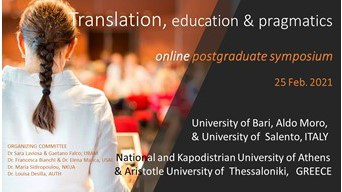Description
Childness in translating for children: Trivizas’ The Last Black Cat in Mandarin Chinese
Zhang Zhan
M.A. ‘English Language, Linguistics and Translation’, Specialization ‘Translation Studies and Interpreting’
Innovative proper names, whimsical employment of word-play and acoustic features of a language are highlights of children’s literature in terms of creating childness in constructing characters and producing humour. Such linguistic creativity, however, is language-specific and could not be easily transferred to other languages in a similar vein. This study examines translation strategies employed in Hu’s (2012) Mandarin Chinese version of Eugene Trivizas’ Greek children’s story, The Last Black Cat attempting to shed light on a less-widely examined language pair. Specifically, it discusses translation techniques of proper names, transfer of word-play and sound-play. The original work exploits nonsensical content in combination with rhymes in slogans to demonstrate the irrationality of social discrimination and the beast in humankind. The Chinese translation failing to reproduce these techniques due to linguistic constraints, prioritized semantic rendering. The study further investigates the effectiveness of various translation strategies, in the Chinese context, by distributing questionnaires to 10 second-year Chinese university students of Greek language major, for examining target reader reception. Participants had to choose from two Chinese options according to their own liking: one was Hu’s translation which focuses on semantic meanings, the other was my creative translation emphasizing naturalness through linguistic and cultural adaptation). Results suggest an overall preference for localized rendering over semantic meaning transfer. The paper draws attention to the significance of target-orientedness in constructing childness in children’s stories, through Greek-Chinese trans¬la¬tion, a language pair which has less widely attracted the attention of scholars.

